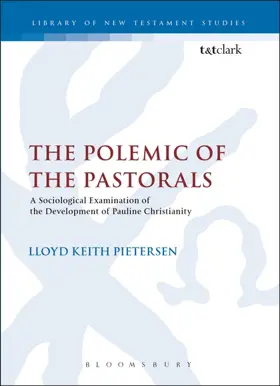

Polemic Of The Pastorals: A Sociological Examination Of The Development Of Pauline Christianity
in Library of New Testament Studies
Pages
192
Publisher
T&T Clark
Published
2004
ISBN-13
9780567081834
Much historical-critical work on the opponents in the Pastoral Epistles has resulted in sweeping generalizations concerning their Jewish and/or Gnostic nature. Literary analyses have been somewhat more promising in focusing on the stereotypical nature of the polemic, but either fail to do justice to the urgency of the language in the Pastorals or do not provide a convincing description of the opponents. Pietersen approaches the problem of the opponents from a socio-scientific perspective. Utilizing labelling theory and social control theory from the sociology of deviance, he argues that the Pastorals function as a literary version of a status degredation ceremony whereby previously influential insiders within the community are transformed into outsiders. This is volume 264 in the Journal for the Study of the New Testament Supplement series.
Reviews
This volume is a revision of the author�s doctoral dissertation, directed by Loveday Alexander at the University of Sheffield. Utilizing insights from modern sociological studies, Pietersen contends that the polemic of the Pastoral Epistles is directed against Jewish-Christian enthusiasts and visionaries who had successfully attracted members of the Pauline churches, particularly women, with a message of realized eschatology, asceticism, and thaumaturgy. The opening chapter provides a succinct summary of the debate concerning the identity of the opponents in the Pastoral Epistles, an issue that Pietersen identifies as the most essential feature of the background of these letters. Pietersen rejects as historically problematic the notion that the heresy confronted in the Pastoral Epistles is an incipient Gnosticism and as unconvincing the view that the polemic is merely a literary device aimed at imaginary opponents. Instead, the fact that certain opponents are named (2 Tim 2:17; 4:14) suggests to Pietersen that the polemic of the Pastorals is directed at specific individuals whom the author perceives as a threat to the community. Chapter 2 introduces the sociological models that Pietersen employs in his attempt to discern the identity of the author�s opponents.
[Full Review]
